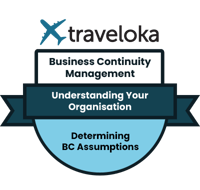Sustaining Digital Travel: Business Continuity Management for Traveloka
Chapter 14
BCM Plan Development Phase for Traveloka

 As a leading digital travel platform, Traveloka operates in a dynamic and competitive environment that requires a robust Business Continuity Management (BCM) framework.
As a leading digital travel platform, Traveloka operates in a dynamic and competitive environment that requires a robust Business Continuity Management (BCM) framework.
The company’s reliance on technology, global partnerships, and customer-centric services necessitates a well-defined approach to managing operational risks and disruptions.
The BCM Plan development phase is critical for ensuring resilience against disruptions that could impact Traveloka’s operations, customer experience, and market reputation.
This phase transforms strategic BCM objectives into actionable plans, ensuring Traveloka’s ability to maintain essential functions during and after a crisis.
Whether dealing with cyber threats, system outages, regulatory changes, or natural disasters, having a comprehensive BCM Plan ensures that Traveloka can quickly recover, minimize losses, and uphold service reliability.
By proactively preparing for potential threats, Traveloka safeguards its technological infrastructure, reinforces customer trust, and strengthens its competitive advantage in the digital travel market.
Understanding the BCM Plan Development Phase
The BCM Plan development phase involves translating risk assessments from the RAR phase and business impact analyses (BIA) into structured recovery strategies and procedures.
For Traveloka, this phase safeguards digital platforms, data integrity, and customer transactions while ensuring a seamless recovery from potential disruptions such as cyber incidents, operational failures, or natural disasters.
Key Steps in the BCP Development Phase
Defining Business Continuity Objectives
 Establish clear recovery goals aligned with Traveloka’s risk tolerance and regulatory requirements.
Establish clear recovery goals aligned with Traveloka’s risk tolerance and regulatory requirements.- Identify critical business functions, including online booking systems, payment gateways, customer support, and data centers.
Developing Recovery Strategies
- IT and Digital Infrastructure Recovery: Implement cloud-based disaster recovery solutions and redundant server capabilities.
- Operational Continuity: Ensure alternative work arrangements and remote access capabilities for employees.
- Customer Service Resilience: Develop multi-channel communication strategies to keep customers informed during disruptions.
Designing Business Continuity Procedures
- Establish detailed response and recovery procedures for crisis scenarios, including cyber threats, system failures, and vendor disruptions.
- Define roles and responsibilities within Traveloka’s BCM team to ensure coordinated incident response.
Resource Allocation and Plan Documentation
- Allocate resources such as backup servers, emergency response teams, and alternate office locations.
- Document the BCM Plan, ensuring it is accessible and understandable for all stakeholders.
Testing and Validation
- Conduct regular BCM Plan testing, including tabletop exercises and simulation drills, to validate plan effectiveness.
- Review test results and update the BCP accordingly to address identified gaps.
Integration with Traveloka’s BCM Planning Methodology
Traveloka’s BCM planning methodology incorporates industry best practices such as ISO 22301 and aligns with regulatory guidelines. The BCM Plan development phase is integrated with:
- Risk Management Frameworks to proactively address potential threats.
- Crisis Management Protocols to ensure a swift and coordinated response.
- Stakeholder Engagement Strategies to maintain transparency with customers, partners, and regulatory bodies.
Summing Up …
The BCM Plan development phase is a fundamental component of Traveloka’s BCM framework. It ensures resilience against disruptions and safeguards operational integrity.
By implementing a structured approach to BCM Plan development, Traveloka can continue delivering seamless travel experiences, reinforcing customer trust and business sustainability.
A well-designed and regularly updated BCM Plan enables Traveloka to respond proactively to unforeseen challenges, minimising downtime and financial losses.
This proactive approach ensures operational continuity, strengthens regulatory compliance, and enhances business reputation.
Moreover, continuous improvement and periodic testing of the BCM Plan ensure that Traveloka remains prepared for an evolving risk landscape.
By embedding resilience into its core operational strategy, Traveloka secures its long-term growth and stability in the ever-evolving travel industry.




















![Register [BL-B-3]*](https://no-cache.hubspot.com/cta/default/3893111/ac6cf073-4cdd-4541-91ed-889f731d5076.png)



![FAQ [BL-B-3]](https://no-cache.hubspot.com/cta/default/3893111/b3824ba1-7aa1-4eb6-bef8-94f57121c5ae.png)
![Email to Sales Team [BCM Institute]](https://no-cache.hubspot.com/cta/default/3893111/3c53daeb-2836-4843-b0e0-645baee2ab9e.png)





